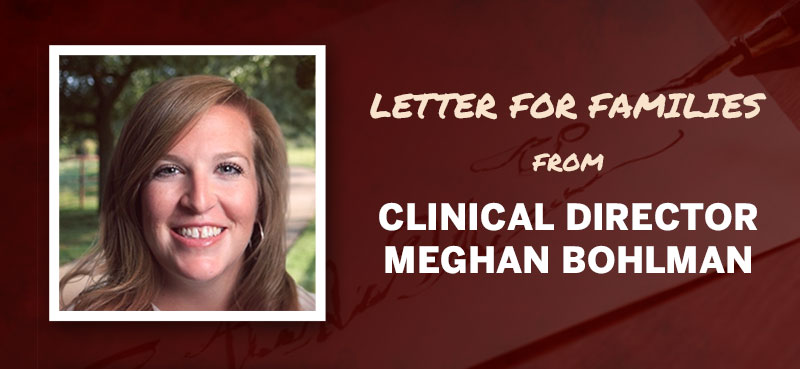
Dear Families,
I often meet you after the whirlwind that ends with your loved one arriving at Burning Tree Ranch. I meet you in the space between relief that your loved one made it into long term treatment and fear that they won’t stay long enough to accept the help being offered. It is in this space that our treatment team will begin construction of something new with you. But remember – new construction takes time and growth is sometimes painful.
We talk with our families at length about how time is one of our greatest gifts at Burning Tree Ranch. We know that 30, 60, and 90-day treatments have not worked for our clients. If it did they would have been sober already. While there are people who can get sober in those facilities, our clients just aren’t those people.
"We know that 30, 60, and 90-day treatments have not worked for our clients. If it did they would have been sober already."
When working with families, I often reference this odd form of amnesia that possesses the alcoholic and addict. It is baffling to watch someone be so desperate and distraught after burning it all to the ground and then, sometimes within days, be equally as convicted that they can control it, or it wasn’t that bad. I see families have this same amnesia. Families share the same desperation when trying to get their loved ones to treatment and become equally as convinced that the client is doing well despite a professional clinical team stating otherwise.
The client will begin to look better physically, begin to sound better and start to believe that maybe 6 months is long enough. Families will start to question if Aftercare is really that important despite their loved one’s history of doing well in all those other treatment centers only to relapse a short while later.
Early on we begin to talk with families about their participation in the disease and most will, without fail, provide assurances that they are committed to doing what we ask of them.
Then, as the client begins to have feelings, to be held accountable, and as their disease begins to ramp up, we will hear families start to defend their loved one, to ask for exceptions; some even begin to question the processes and approaches we have here.
"Early on we begin to talk with families about their participation in the disease and most will, without fail, provide assurances that they are committed to doing what we ask of them."
At Burning Tree Ranch, we will ask that you begin participating in treatment the way we believe you need to. We are going to ask that you trust the process and follow the direction of the treatment team. We are going to ask that you attend a series of activities like a Family Workshop, Family Program, etc. and begin participating in Al-Anon.
We will begin to confront ineffective family dynamics in real time, even if they are uncomfortable for you. We view this as a life and death errand and frankly, we are okay with you and your loved one being uncomfortable.
What we know to be true is that you love your addict/alcoholic. We also know that the disease of addiction takes love and uses it as a weapon. Sadly, we have seen many families literally love their addict/alcoholic to death. At Burning Tree Ranch, we are going to ask that you let go of your control, hand us the reins and follow direction.
"What we know to be true is that you love your addict/alcoholic. We also know that the disease of addiction takes love and uses it as a weapon."
This will be difficult at times. There will be moments when you may not want to do what we are asking you to do. But even when it’s hard, we are going to ask that you support our process – and do it anyway.
We aren’t for everyone and we understand that, but, we do have a way – and it is a way that works.
Sincerely,
Meghan Bohlman
LPC, LCDC, EMDR Trained
Clinical Director for Burning Tree Ranch





